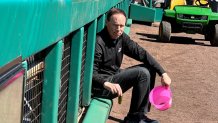One of the Hartford Yard Goats’ alternate identities has got a lot of people talking. The team will take the field as the Hartford Bouncing Pickles on May 17.
To find out the origins of the name, we have to go back to 1948.
An article in the Hartford Courant detailed the arrest of two pickle packers accused of conspiring to sell pickles unfit for human consumption.
According to the article, samples of the pickles were putrid, decomposed and containing maggots. While the pickles were sent to a lab, according to the Courant, the Food and Drug Commissioner Frederick Holbrook offered his own advice for picking the perfect pickle: drop it from a height of one foot to see if it bounces. If it doesn’t, it’s no good.
Get Connecticut local news, weather forecasts and entertainment stories to your inbox. Sign up for NBC Connecticut newsletters.
If it Doesn’t Bounce, Don’t Eat an Ounce
The story led people to believe it’s written into Connecticut law that it’s illegal to sell a pickle that doesn’t bounce.
To set the record straight, we went to Holbrook’s modern day counterpart, the commissioner of the Department of Consumer Protection, to set the record straight.
When asked if Connecticut has a bouncing pickle law, Bryan Cafferelli said,” The answer is no, we don’t.”
There’s nothing in state statute that refers specifically to pickles. Cafferelli said pickles, and all pickled vegetables for that matter, are protected under the state’s Uniform Food, Drug and Cosmetic Act, specifically the statutes regarding adulterated food.

In fact, the pickle packers in the 1948 case were charged with violating a statute “concerning adulteration and misrepresentation of food products,” according to the Courant article.
But let’s face it, a bouncing pickle law makes a better story.
Food for Thought
The story has been so well preserved, it made us wonder if the bounce test is rooted in actual science.
We asked Bonnie Burr, assistant director of the UConn Extension, to be our unofficial pickle professor. She introduced us to another “P” word: pectin.
“The pectin is what holds it together and the microbial action starts to break down in your cucumber if you leave it out,” she said.
“When you get that nice crunchy pickle, that's when we know that it's been it's been harvested and preserved in the manner that it's going to allow it to be just a lot tighter in its makeup. And so is it going to actually bounce? Probably not. But it's certainly not going to be smushed when you drop it on your counter or you drop it, god forbid, on the floor,” she said.
Unscientific Test
Once we learned the history and the science behind the bouncing pickles, we decided to put it to the test. And we figured where better to do so than Dunkin’ Park, home of the Bouncing Pickles (on May 17 anyway).
We dropped sours, half sours, dills, gherkins and deli pickles from different heights around the ballpark. The 1948 standard was one foot, so we started out by the dugout.
Each pickle passed the bounce test, even as we climbed a six-foot ladder at home plate and then went into the stands, about 15 feet up from the field.
We did drop some pickles multiple times, so by the end one of the deli pickles hit a grand slam, so to speak, and split apart upon impact.
It’s hard to judge which was the Most Valuable Pickle (MVP), but it’s clear this investigation was a juicy one.

